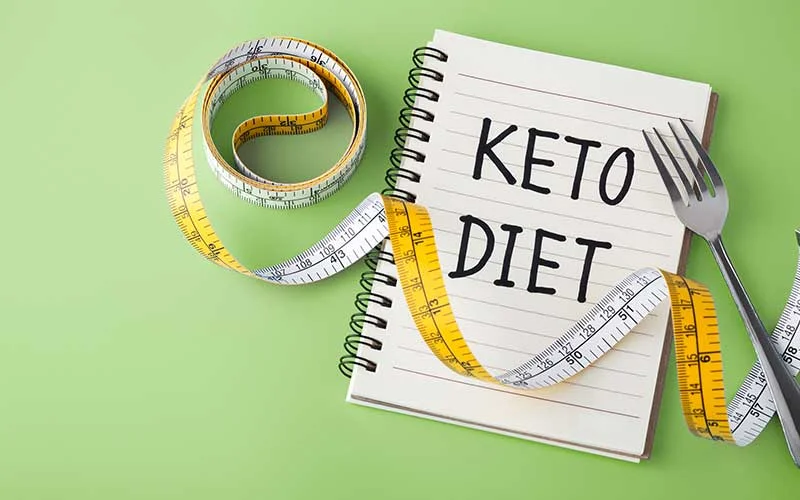These containers hold a variety of items, including fish-infused rice, cheese selections, nutrient-rich eggs, and an assortment of vibrant vegetables.
Are you looking for a diet you can confidently follow in the long run? If so, you may be familiar with the keto diet. This dietary choice has gained popularity worldwide, although some people find it really hard to follow. To help you get started on the keto diet with clarity, we’ll guide you with some simple steps to begin your journey with the ketogenic lifestyle.
What is the Keto Diet?
The goal of the keto diet is to help your body burn fat for energy by replacing relatively few carbohydrates with fat. When you eat fewer carbs, your body starts burning fat instead. This process is called ketosis, where your liver turns fat into small energy molecules called ketones. Your brain and other organs use these ketones for energy.
Your insulin levels decrease, which can help your body tap into its fat stores for energy on a keto diet. Many studies have shown that people can lose weight on a keto meal plan without counting calories. In addition, a low carb diet may have other positive effects on your health, such as lowering blood sugar levels.
What is Ketosis?
Ketosis is a metabolic state where your body uses fat as fuel instead of carbs. This happens when you reduce your carb intake, limiting the supply of glucose, the main energy source for your cells. This means eating fewer than 50 grams of carbs daily and focusing on foods like meat, fish, eggs, nuts, and healthy oils. Modifying your protein intake is important because too much protein can slow the transition into ketosis since it can be converted into glucose.
If you want to enter ketosis faster, intermittent fasting can be helpful. This involves limiting your eating window to around 8 hours daily and fasting for the remaining 16 hours. To know if you’re in ketosis, tests are available that measure the amount of ketones in your blood, urine, or breath. Certain signs like increased thirst, dry mouth, frequent urination, and reduced hunger or appetite may indicate that you’ve entered ketosis.
The Mechanism Behind the Keto Diet: How Does It Operate?

When your body uses ketones for fuel instead of carbs, you don’t experience energy crashes or brain fog like you do when eating lots of carbs. Imagine the tired feeling you get after eating a big bowl of pasta for lunch. That doesn’t happen on the keto diet. When your body burns fat for energy, it can use stored fat.
Ketosis also helps your brain make more power generators for your cells called mitochondria. This means more energy for your cells and more energy to get things done. Your brain is mostly made up of fat, so it needs fat to work well. The good fats you eat on a ketogenic diet not only fuel your daily activities but also nourish your brain.
How to Get Started with Keto Diets?

To achieve success on a keto diet, you need to align your calorie intake, macronutrient ratios, and meal planning with your specific goals. Whether it’s weight loss, muscle gain, improved performance, or better health, understanding your objectives will guide your dietary needs and help track progress.
Calculate your daily calorie goal, determine your ideal keto macros, and plan a menu that includes nutritious choices. By simplifying the process and making mindful decisions, you can optimize your keto journey and increase your chances of achieving desired outcomes.
Key Facts About the Keto Diet
Here are some key facts about the keto diet:
- The diet was developed in 1921.
- The ketogenic (keto) diet mainly consists of high fats, moderate proteins, and very low carbohydrates.
- It reduces carbohydrate intake to less than 50 grams per day, which is less than what’s in a medium plain bagel.
- The diet mimicking starvation puts the body into a metabolic state called ketosis.
- The diet primarily forces the body to use fat as its main energy source.
- It may aid weight loss, improve acne, and lower the risk of certain cancers.
- The long-term safety and effects of the diet are still uncertain.
Health Benefits of Keto
The ketogenic diet was originally developed to treat neurological diseases like epilepsy. Studies suggest that the ketogenic diet can offer benefits for various health conditions.
Heart disease: Eating a healthy diet can improve risk factors like body fat, cholesterol levels, blood pressure, and blood sugar.
Parkinson’s disease: There is some research that shows the diet may improve symptoms of Parkinson’s.
Polycystic ovary syndrome: The ketogenic diet can help lower insulin levels, which is important for this syndrome.
Brain injuries: Early research suggests that the diet could potentially improve outcomes for traumatic brain injuries.
Potential Side Effects of Keto
The ketogenic diet is generally safe for healthy people, but there can be initial side effects as your body adapts.
- Some people may experience what is commonly referred to as the “keto flu,” which usually lasts a few days.
- Symptoms of the keto flu include diarrhea, constipation, vomiting, poor energy and mental function, increased hunger, sleep issues, nausea, digestive discomfort, and decreased exercise performance.
- To minimize these symptoms, try a regular low-carb diet for the first few weeks to help your body burn more fat before eliminating carbs.
- A ketogenic diet can affect your body’s water and mineral balance, so adding extra salt to your meals or taking mineral supplements may be helpful.
Especially in the beginning, it’s important to eat until you feel full and avoid excessively restricting calories. A ketogenic diet often leads to weight loss without intentionally limiting calories.
Who Should Try Keto Diets?
A keto diet may be beneficial for the following individuals:
- A study showed that following the keto diet for a year helped reverse diabetes in around 60% of participants.
- Those with chronic conditions like epilepsy, PCOS, and diabetes may benefit from the diet.
- Individuals wanting to lose weight may benefit from a keto diet due to its ability to boost the metabolism and reduce appetite.
Who Should Avoid Keto Diets?
The ketogenic diet is not recommended for the following groups of people:
- Pregnant women trying to lose weight during pregnancy is not advised.
- Keto is unsuitable for individuals who have struggled with eating disorders.
- People with kidney damage, pre-existing liver or pancreatic conditions, and those who have had their gallbladder removed. People with blood sugar issues including those with heart and liver disease.
- People with high blood glucose levels who take regular insulin doses, metformin supplements, or other medications.
- Anyone concerned with stress on their kidneys or kidney stones.
FAQs
Is Keto Diet Safe for Beginners?
The ketogenic diet can be safe for beginners if followed properly and with guidance. Consult with a registered dietitian before starting any new diet, including the low carb diet.
Can Keto Diet Sustain in the Long-term?
The long-term sustainability of the ketogenic diet varies from person to person. Some people may find it challenging to maintain the strict rules for ketosis for a long time. Working with a healthcare professional to develop a sustainable and balanced eating plan is advisable.
Can Keto Diet Help with Weight Loss?
The ketogenic diet is effective for weight loss because it can reduce hunger and help with the amount of fat burned. However, calorie intake and physical activity also play a role in weight loss.
Can I Consume Fruits While on a Keto Diet?
Fruits are generally limited on the ketogenic diet due to their higher carbohydrate content. However, small portions of low-carb fruits like berries can be incorporated into a keto diet in moderation. Tracking your carbohydrate intake and adjusting accordingly to stay within the desired macronutrient range is essential.
Can I Drink Alcohol While Following a Keto Diet?
Alcohol can be consumed on a ketogenic diet, but choose low-carb options and moderate your intake. Some keto-friendly alcohol choices include spirits like vodka, gin, and tequila, consumed straight or mixed with sugar-free mixers. It’s crucial to be mindful of the potential impact on ketosis and overall calorie consumption.
Final Thoughts
While a keto diet may offer some individuals a healthier and simpler eating approach, it may only be suitable and practical for some. Its therapeutic origins make it a highly restrictive diet with potential barriers for the average person to adopt and maintain.
Moreover, the health advantages linked to the ketogenic diet might not be relevant to everyone. It’s important to mention that carbohydrates and saturated fat don’t align with the principles of the low carb diet or other weight loss nutritional plans overall.
While many studies have been conducted and are still ongoing regarding diets, more research is necessary to completely grasp the pros and cons of this eating plan beyond its clinical uses.
RV Team
* Reviewology is in partnership or collaborates with top brands highlighted on this site, including those occupying the top ranking positions.
Additionally, we earn affiliate commissions from products showcased on this website when you make a purchase through the provided links on Amazon or the company website directly.
We appreciate your support using our links to purchase your favorite brands or newly discovered brands.
Latest updates
I Thought I’d Always Feel Tired, Fat, and Forgotten—Until This
310 Greens vs AG1
The Truth About 310 Greens: A No-Nonsense Review of This Popular Supplement
Popular
I Thought I’d Always Feel Tired, Fat, and Forgotten—Until This
310 Greens vs AG1
The Truth About 310 Greens: A No-Nonsense Review of This Popular Supplement
© 2024 Reviewology. All Rights Reserved.
